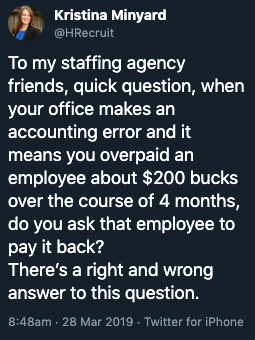I’ve gotten a chance to work both sides of the fence for an extended period of time in the Talent Acquisition/Recruiting/Staffing game. For ten years I ran corporate talent acquisition shops for some very large organizations. One organization spent over $3M annually on staffing agency fees! Obviously, prior to my getting there!
I’ve spent almost fifteen years on the agency side, sandwiched in between my corporate experience. What I’ve learned along the way is that there isn’t a “free” option when it comes to hiring great talent.
Frequently, I get asked from clients for discounts to my fees on the agency side. I get that. When I was on the corporate side, I would never take an agency’s first offer. Here’s the main problem with all of this:
Corporate talent acquisition pros don’t want any of it. They don’t your 20% direct fee, they don’t want your retained plan, they don’t want your RPO plan. What they want is Free. A free option.
Therein lies everything you need to know about staffing agencies and corporate talent acquisition. One side wants free. One side needs to get paid.
The reality is, even staffing on your own on the corporate side isn’t free. Corporate talent acquisition done right has a ton of costs. Recruitment tools, automation, branding, job boards, applicant tracking, college strategy, recruiter training, and hiring, etc. None of that is free.
All of this, though, should be screaming to the agency folks that something isn’t right. What corporate talent acquisition pros are saying is “we don’t like the options we are getting from agencies”. This should be of serious concern because there are companies trying to design other options for corporate talent acquisition pros. Options where they’ll feel like they are getting the value they want.
These options aren’t free, either, but they are less than all of the traditional options that 99% of staffing agencies are offering.
When I was on the corporate TA side of the desk, here was my decision matrix to when I would use a staffing agency.
This matrix made me feel good about my decision to use an agency:
1. Does my team have the capacity to do this search? If Yes, why would I pay to have this done? If No, the cost is justifiable.
2. Does the agency offer me recruitment expertise and/or pipeline I don’t have on my team? See #1 for Yes and No options.
3. Is it financially feasible for me to add more capacity to my team, as compared to an agency option? This one took some more work. If I had a need for an agency to fill, let’s say, three positions and it was going to cost me $100K, well, obviously I could hire a pretty good recruiter for $100K. But, would I need that Recruiter in year 2, 3, etc.? Adding headcount isn’t a one time cost for an organization.
Ultimately, for me on the corporate side, it was almost always a capacity issue. I had the expertise, but we had bubbles of work I needed extra support with. Too often, I see corporate TA leaders upset over agency spend and it’s based on the fact they don’t have good recruiters on their team, yet they’re unwilling to change this fact. I’ll pay for additional short term capacity. I won’t pay for expertise I should have on my team every day. That becomes my issue!
Corporate TA leaders become frustrated over agency spend because ultimately it’s a reflection on the team they have created.


